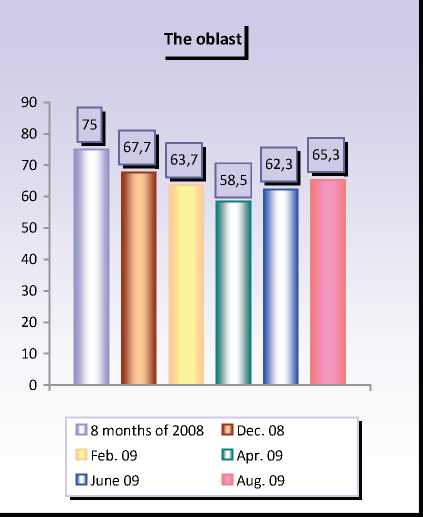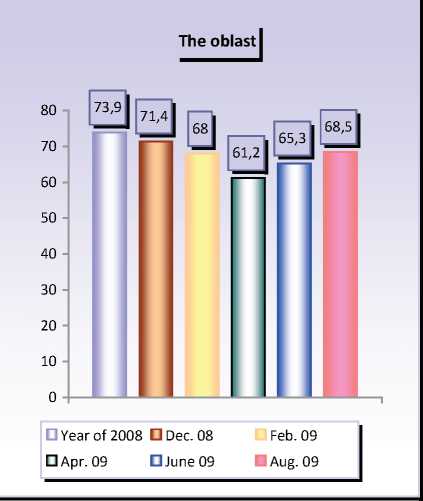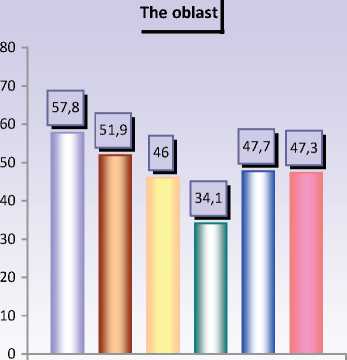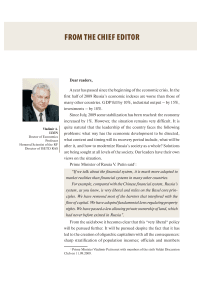From the chief editor
Автор: Ilyin Vladimir Aleksandrovich
Журнал: Economic and Social Changes: Facts, Trends, Forecast @volnc-esc-en
Рубрика: From the chief editor
Статья в выпуске: 3 (7) т.2, 2009 года.
Бесплатный доступ
ID: 147223144 Короткий адрес: https://sciup.org/147223144
Текст ред. заметки From the chief editor
Professor
Honored Scientist of the RF Director of ISETD RAS
Dear readers,
A year has passed since the beginning of the economic crisis. In the first half of 2009 Russia’s economic indexes are worse than those of many other countries. GDP fell by 10%, industrial output – by 15%, investments – by 18%.
Since July, 2009 some stabilization has been reached: the economy increased by 1%. However, the situation remains very difficult. It is quite natural that the leadership of the country faces the following problems: what way has the economic development to be directed, what content and timing will its recovery period include, what will be after it, and how to modernize Russia’s society as a whole? Solutions are being sought at all levels of the society. Our leaders have their own views on the situation.
Prime Minister of Russia V. Putin said1:
“If we talk about the financial system, it is much more adapted to market realities than financial systems in many other countries.
For example, compared with the Chinese financial system, Russia’s system, as you know, is very liberal and relies on the Basel core principles. We have removed most of the barriers that interfered with the flow of capital. We have adopted fundamental laws regulating property rights. We have passed a law allowing private ownership of land, which had never before existed in Russia” .
From the said above it becomes clear that this “very liberal“ policy will be pursued further. It will be pursued despite the fact that it has led to the creation of oligarchic capitalism with all the consequences: sharp stratification of population incomes; officials and members of the top brass bribery; the oligarchs’ desire to protect their gripped capitals abroad; their appeals to the state to support their companies during the crisis period – the requirements that are accompanied with the threat of dismantling jobs and acute social conflicts provoked by this dismantling; and finally, the endless pursuit of maximum profits which leads to disasters, like the tragedy at the Sayan-Shushenskaya hydroelectric plant on August, 17 in 2009 2.
It should be noted that the President Medvedev D.A. in his article “Go Russia!” from 10.09.2009 evaluates slightly in a different way3:
“The global economic crisis has shown that our affairs are far from being in the best state. Twenty years of tumultuous change has not spared our country from its humiliating dependence on raw materials. Our current economy still reflects the major flaw of the Soviet system: it largely ignores individual needs. With a few exceptions domestic business does not invent nor create the necessary things and technology that people need. We sell things that we have not produced, raw materials or imported goods. Finished products produced in Russia are largely plagued by their extremely low competitiveness.
Figure 1. How do you assess the current activities of the Russian President Dmitry Medvedev? * (the answer is “completely and largely approve”)

Figure 2. How do you assess the current activities of the Chairman of the Government of the Russian Federation
Vladimir Putin? (the answer is “completely and largely approve”)

This is why production declined such much, more than in other economies, during the current crisis. This also explains excessive stock market volatility. All this proves that we did not do all we should have done in previous years. And far from all things were done correctly”.
The President also dwells on five strategic vectors for the modernization of the country: energy, nuclear and information technologies, space infrastructure, modern medical equipment, development of agro-industrial complex and social sphere in the country, stressing that “inventors, innovators, researchers, teachers, entrepreneurs who introduce new technologies, will become the most respected people in society. In turn, society will give them everything they need to be productive” .
The President of Russia concludes his article “Go Russia!” with an objective assessment of the real situation in the country established over the past 20 years:
“People will attempt to interfere with our work. Influential groups of corrupt officials and do-nothing “entrepreneurs” are well ensconced. They have everything and are satisfied. They’re going to squeeze the profits from the remnants of Soviet industry and squander the natural resources that belong to all of us until the end. They are not creating anything new, do not want development, and fear it”.
The article of Medvedev D.A. on Russia’s state and society is impartial. The proposed areas of modernization of the economy are
Figure 3. How do you assess the current activities of the Governor of the Vologda region?
(the answer is “completely and largely approve”)

□ 8 months of 2008 □ Dec. 08 Feb. 09
□ Apr. 09 □ June 09 □ Aug. 09
Table 1. Dynamics of an index of consumer moods
|
The 1st half of 2008 |
107.8 |
|
The 1st half of 2009 |
70.9 |
|
Increase/decrease (the 1st half of 2009 to the 1st half of 2008) |
-36.9 |
|
August, 2008 |
108.6 |
|
August, 2009 |
75.9 |
|
Increase/decrease (the 1st half of 2009 to the 1st half of 2008) |
-32.7 |
|
Table 2. Dynamics of social mood , % Normal state; in a good mood |
|
|
The 1st half of 2008 |
69.9 |
|
The 1st half of 2009 |
51.1 |
|
Increase/decrease (the 1st half of 2008 to the 1st half of 2009) |
-18.8 |
|
August, 2008 |
71.0 |
|
August, 2009 |
53.4 |
|
Increase/decrease (the 1st half of 2009 to the 1st half of 2008) |
-17.6 |
|
Feel effort, irritation, fear, depression |
|
|
The 1st half of 2008 |
23.2 |
|
The 1st half of 2009 |
38.7 |
|
Increase/decrease (the 1st half of 2008 to the 1st half of 2009) |
15.5 |
|
August, 2008 |
21.7 |
|
August, 2009 |
39.4 |
|
Increase/decrease (the 1st half of 2009 to the 1st half of 2008) |
17.7 |
Table 3. Dynamics of level of a stock of patience , %
To be quite well off; to have a difficult life but can be patient
|
The 1st half of 2008 |
81.2 |
|
The 1st half of 2009 |
70.2 |
|
Increase/decrease (the 1st half of 2008 to the 1st half of 2009) |
-11.0 |
|
August, 2008 |
80.4 |
|
August, 2009 |
74.2 |
|
Increase/decrease (the 1st half of 2009 to the 1st half of 2008) |
-6.2 |
It is impossible to be in great distress
|
the 1st half of 2008 |
11.1 |
|
the 1st half of 2009 |
18.3 |
|
Increase/decrease (the 1st half of 2008 to the 1st half of 2009) |
7.2 |
|
August, 2008 |
10.2 |
|
August, 2009 |
14.9 |
|
Increase/decrease (the 1st half of 2009 to the 1st half of 2008) |
4.7 |
fundamentally unobjectionable. Now the main things are to go to the real integrated planning for the next 3, 5, 10 years and its practical implementation.
Who and in what time-frame will do it?
What will be the decision-making?
How will the opinion of the expert scientific community be taken into account?
These questions require answers in the short run.
Now it is obvious that the country was drawn into the next political cycle related to the elections of the President of Russia in 2012.
It would be impossible to spend two and a half years for talks and to miss the time for decision-making, as it happened, for example, with one of the key indicators pointing out the actual policy of the state in the development of scientific and technological capabilities – with the internal research and development costs:
The above figures show that the share of domestic research and development costs in the gross domestic product has almost unchanged. As a result of this dynamic the country has lagged more behind other highly industrialized countries.
Internal research and development costs,
|
The country |
in % of GDP |
|
|
2000 г. |
2007 г. |
|
|
Russia |
1,05 |
1,12 |
|
USA |
2,77 |
2,62 |
|
Germany |
2,47 |
2,58 |
|
France |
2,05 |
2,11 |
Russia’s movement forward to the achievement of the am- bitious goals is only possible when the leaders of the country will move to civilized, transparent and systematic “forced” modernization.
k
Dear readers, according to tradition we inform you about the changes that have occurred in the journal since the release of its previous issue.
Our site contains the English version of the sixth issue of the journal. Thus, during the past six months the access to the articles published in the journal is opened for everyone who is interested in sociology and economics.
In the seventh issue of the journal, as it was planned, some themes are devoted to food security and agro-industrial sector of the North-West federal district of Russia.
In the eighth issue, the release of which is scheduled for the fourth quarter of 2009, a lot of materials will be linked with the problems and prospects of development of machine building in the North-West of Russia. However, the editors will consider with interest articles which will extend the stated themes, will allow to open new journal sections.
According to the preliminary subject plan for 2010 the issues of the journal will focus on the following: improving local governance (March), the development of the energy base and energy safeguarding in the regions of NWFD (June); social development of the European North (September), the development of foreign economic activities in the regions of NWFD (December).
Dear readers and colleagues, we are looking forward to your proposals for revisions to the proposed project themes, as well as interesting materials about life of the regions, prospects for their development, ways to end the country’s financial and economic crisis.
Список литературы From the chief editor
- Krichevsky N. Post-Pikalevo Russia: New Political and Economic Reality http://www.inozemtsev.net, http://www.krichevsky.ru
- Official website of the President of Russia http://www.kremlin.ru/transcripts/5413


